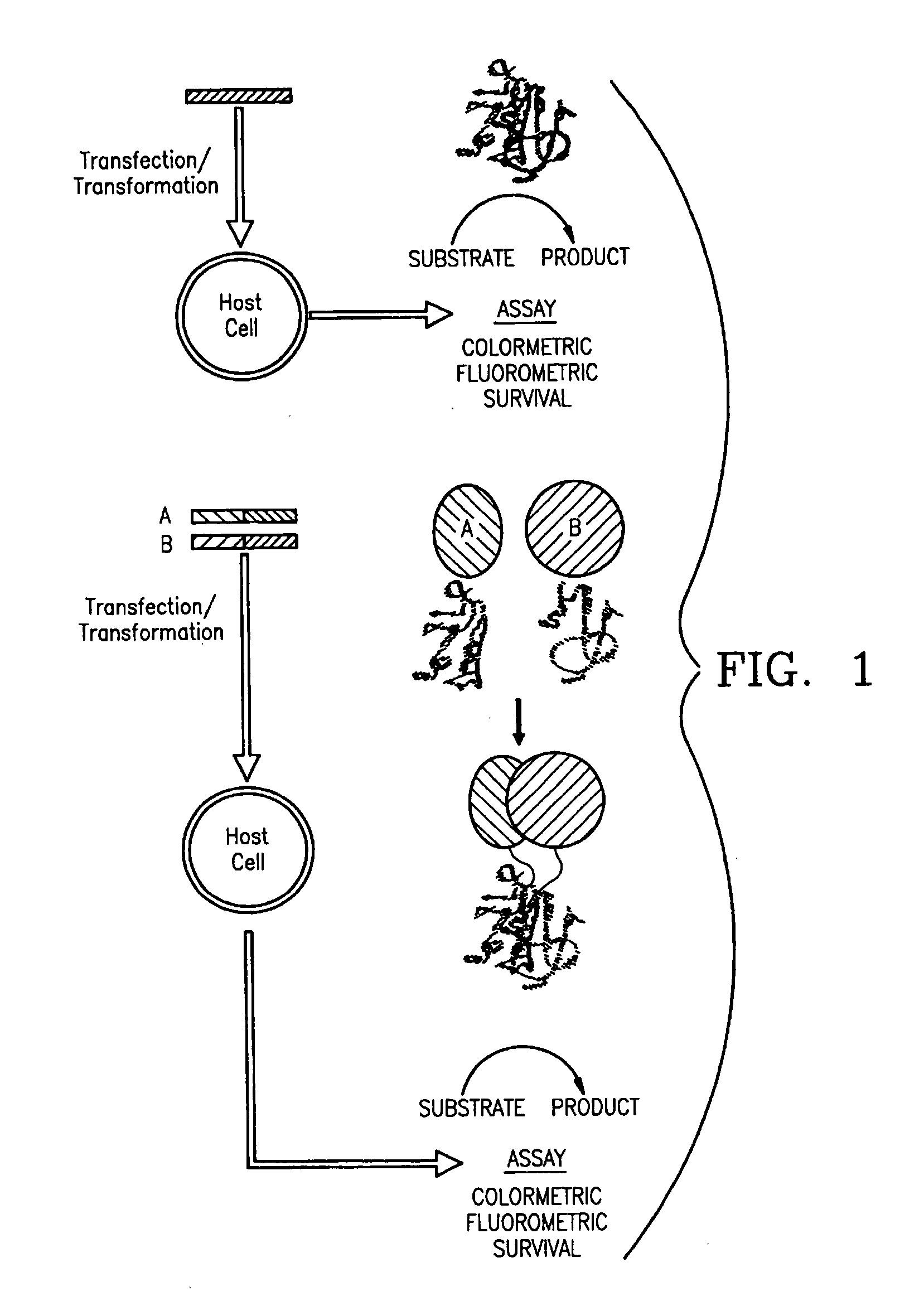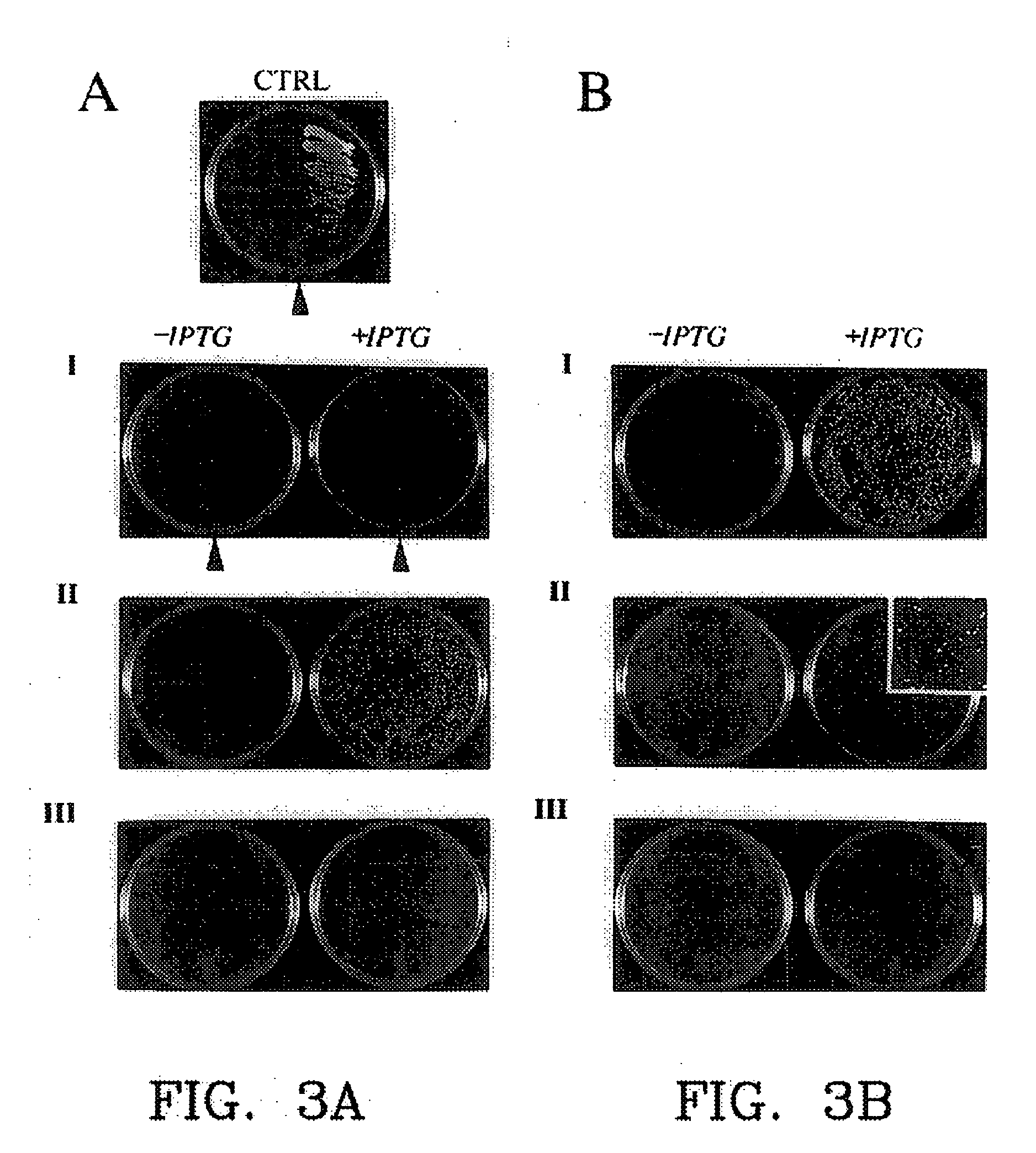Protein fragment complementation assays in whole animals applications to drug efficacy, ADME, cancer biology, immunology, infectious disease and gene therapy
a technology of protein fragments and assays, applied in the field of protein fragment complementation assays in whole animal applications to drug efficacy, adme, cancer biology, immunology, infectious diseases and gene therapy, can solve the problems of inability to distinguish induced versus constitutive interactions, few convenient methods for studying proteins, and inability to detect high-throughput cdna libraries
- Summary
- Abstract
- Description
- Claims
- Application Information
AI Technical Summary
Benefits of technology
Problems solved by technology
Method used
Image
Examples
example 1
[0140] Experimental Protocol
[0141] DNA Constructs.
[0142] Mutagenic and sequencing oligonucleotides were purchased from Gibco BRL. Restriction endonucleases and DNA modifying enzymes were from Pharmacia and New England Biolabs. The mDHFR fragments carrying their own iN-frame stop codon were subcloned into pQE-32 (Qiagen), downstream from and iN-frame with the hexahistidine peptide and a GCN4 leucine zipper (FIG. 1; FIG. 2). All final constructs were based on the Qiagen pQE series of vectors, which contain an inducible promoter-operator element (tac), a consensus ribosomal binding site, initiator codon and nucleotides coding for a hexahistidine peptide. Full-length mDHFR is expressed from pQE-16 (Qiagen).
[0143] Expression Vector Harboring the GCN4 Leucine Zipper
[0144] Residues 235 to 281 of the GCN4 leucine zipper (a SalI / BamHI 254 bp fragment) were obtained from a yeast expression plasmid pRS3169. The recessed terminus at the BamHI site was filled-in with Klenow polymerase and th...
example 2
[0188] Applications of the PCA Strategy to Detect Novel Gene Products in Biochemical Pathways and to Map Such Pathways
[0189] Among the greatest advantage of PCA over other molecular interaction screening methods is that they are designed to be performed both in vivo and in any type of cell. This feature is crucial if the goal of applying a technique is to identify novel interactions from libraries and simultaneously be able to determine if the interactions observed are biologically relevant. The detailed example given below, and other examples at the end of this section illustrate how it is that validation of interactions with PCA is possible. In essence, this is achieved as follows. In biochemical pathways, such as hormone receptor-mediated signaling, a cascade of enzyme-mediated chemical reactions are triggered by some molecular event, such as by hormone binding to its membrane surface receptor. Enzyme interactions with protein substrates and protein-protein or protein-nucleic ac...
example 3
[0228] Other Examples of Protein Fragment Complementation Assays
[0229] Other examples of assays are herein examplified. The reason to produce these assays is to provide alternative PCA strategies that would be appropriate for specific protein association problems such as studying equilibrium or kinetic aspects of assembly. Also, it is possible that in certain contexts (for example, specific cell types) or for certain applications, a specific PCA will not work but an alternative one will. Further below are brief descriptions of each other PCAs embodiments.
[0230] 1) Glutathione-S-Transferase (GST) GST from the flat worm Schistosoma japonicum is a small (28 kD), monomeric, soluble protein that can be expressed in both prokaryotic and eukaryotic cells. A high resolution crystal structure has been solved and serves as a starting point for design of a PCA. A simple and inexpensive colorimetric assay for GST activity has been developed consisting of the reductive conjugation of reduced g...
PUM
| Property | Measurement | Unit |
|---|---|---|
| OD | aaaaa | aaaaa |
| pH | aaaaa | aaaaa |
| pH | aaaaa | aaaaa |
Abstract
Description
Claims
Application Information
 Login to View More
Login to View More - R&D
- Intellectual Property
- Life Sciences
- Materials
- Tech Scout
- Unparalleled Data Quality
- Higher Quality Content
- 60% Fewer Hallucinations
Browse by: Latest US Patents, China's latest patents, Technical Efficacy Thesaurus, Application Domain, Technology Topic, Popular Technical Reports.
© 2025 PatSnap. All rights reserved.Legal|Privacy policy|Modern Slavery Act Transparency Statement|Sitemap|About US| Contact US: help@patsnap.com



